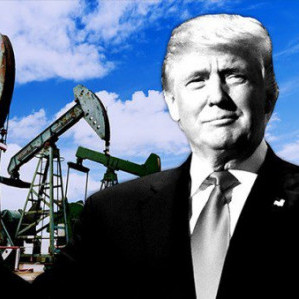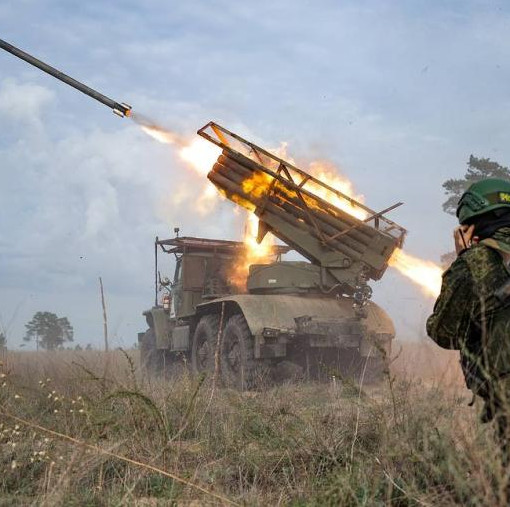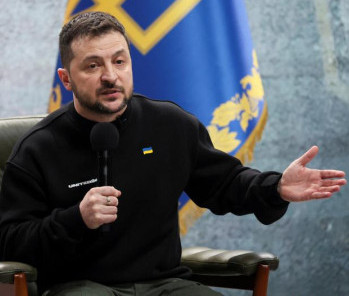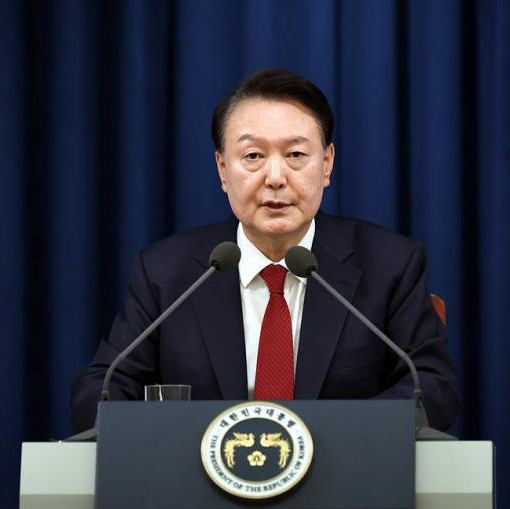
No-confidence vote in the French cabinet raises concerns over Ukraine military aid; Washington may reevaluate its position on BRICS under Donald Trump. Meanwhile, President Vladimir Putin announced a full recovery of the Russian economy at an investment forum. These stories topped Thursday's newspaper headlines in Russia, according to TASS news agency.
Vedomosti: No-confidence vote in French government may delay military aid to Ukraine
The French government’s departure may slow the provision of military assistance to Ukraine, French Defense Minister Sebastien Lecornu warned. According to him, so far, France has been sending weapons to Ukraine from the French army’s stocks, which are replaced with new equipment from the budget. "If the order of new weapons is delayed, [weapons] supplies for Ukraine will slow down, too," Le Parisien quoted France’s defense chief as saying. Moreover, the failure to pass a budget, which was the root cause of the government’s collapse, will result in a loss of 3.3 billion euros for the army, Lecornu said.
The current cabinet, led by Michel Barnier of the conservative Republicans party, was formed on September 5, 2024. Far-right and left parties joined forces to collapse the government, with 331 lawmakers supporting the no-confidence motion in a vote on Wednesday.
The current crisis in France calls into question the policies formulated by Paris and Brussels, as Ukraine has certainly been a key driver behind actions by the French government, said Yuri Rubinsky, who heads the Center for French Studies at RAS's Institute of Europe. In his opinion, the Barnier government was ousted primarily because French President Emmanuel Macron and his circle failed to compromise with the right-wing National Rally party, which is supported by a large army of 11 million voters. According to the expert, the latest developments in France showed that the constitutional system of government, or the French Fifth Republic, established by Charles de Gaulle in the late 1950s, needs a revamp. Similar problems will also affect the functioning of the European Union, where France plays a pivotal role, Rubinsky concluded.
Fyodor Lukyanov, editor-in-chief of the Russia in Global Politics magazine, sees no need to look for any hidden motives behind Lecornu’s remark: as long as political chaos reigns in France, any Ukraine-related decisions will be delayed. It is unclear how French politicians will form a new government, with the current composition of parliament preventing any party from forming a government on its own, Lukyanov explained. "In theory, left and right parties could unite to build a majority, but this is impossible, as they are poles apart," the expert told Vedomosti. A government formed by the National Rally and Macron’s party looks unlikely, he said. Macron could also try to dismantle the New Popular Front, a left-wing alliance, but a very long bargaining process is in store for him in any case, Lukyanov believes.
Izvestia: United States may reevaluate its stance toward BRICS under Trump
The United States, led by the current administration, does not oppose the expansion of BRICS, as Washington believes that all countries can decide which groups they wish to join, the US Embassy in Moscow told Izvestia. However, the White House could reassess its position once Donald Trump returns. The US president-elect and his team are largely concerned with the risk of BRICS, whose share in global GDP has already surpassed that of the G7, potentially undermining the role of the US dollar in the global financial system. Trump has already warned the grouping that he would impose 100% tariffs on it and deny it access to the US market unless BRICS countries commit to using the dollar and refrain from creating their own currency.
Moving away from the USD has not been an end in itself for BRICS, but de-dollarization seems to have become an irreversible process, especially within the grouping, primarily due to the United States’ sanctions policy. Russian President Vladimir Putin claimed at the "Russia Calling!" investment forum on December 4 that the mere fact of using the dollar as a global reserve currency has generated $10 trillion for the United States over the past decade. While the United States has been using the dollar to exploit other economies, the currency has been losing influence on the global financial system recently, the Russian leader argued.
The consistent development of BRICS can significantly transform the current world order and international institutions, including financial ones. "The group can become a forerunner of more meaningful reform at the United Nations. And it can create models that would reflect today’s realities. <...> The dollar-based system is inadequate and can even threaten the sovereignty of individual countries," Viktoriya Panova, head of the BRICS Expert Council, told Izvestia.
However, it’s worth noting that BRICS leaders have repeatedly stated that it is too early to discuss establishing a common BRICS currency and that the grouping is not pursuing this goal. There will also not be any 100% tariffs, as such a move would seriously harm the United States, Mikhail Mironyuk, associate professor with the Department of Politics and Management at the Higher School of Economics, said. The United States is mutually interdependent on many BRICS members, especially China, India, and Brazil.
Izvestia: Putin declares full recovery of the Russian economy
The Russian economy has fully recovered from a challenging period and has already shown a significant shift, with GDP growing by 4.1% in January-October 2024 and unemployment dropping to a record low of 2.3%, President said at the plenary session of the "Russia Calling!" investment forum hosted by VTB on Wednesday. Experts attribute this achievement to a reorientation toward domestic production after the departure of Western companies. Even though several economies have proven to be unreliable partners, Russia will not hinder their businesses from returning to the Russian market, but they should not expect any preferential conditions upon their return, Putin emphasized. Russia currently prioritizes developing partnerships with friendly countries and combating inflation, which has remained "quite high," the president said.
"Today, the Russian economy is more isolated, but this has its advantages, too," lead analyst at Freedom Finance Global, Natalya Milchakova, explained to Izvestia. Among other positive aspects, Russia is not becoming a commodity appendage of either India or China, even after it redirected its hydrocarbon exports from the West to the East. Instead, the country is developing its own manufacturing industry, which will drive industrial growth this year, as it did in 2023, she maintained.
Machine building, the production of equipment, as well as finished metal products, cars, computers, electronics, and optical products are growing at a quicker pace, Tatiana Belyanchikova from the Global Financial Markets Department at the Plekhanov Russian University of Economics told Izvestia, describing this as a natural progression. "In other words, the West has forced Russia to develop advanced industries, and it could not have predicted that this would happen at such a rapid pace," she added.
Moreover, Putin said, Russia has nearly adapted to Western capital outflows by increasing investment in fixed assets and boosting domestic production. Milchakova noted that the Russian investment climate is favorable for many industries, even despite the high key rate, and largely due to business support programs.
Belyanchikova suggests that ensuring a more transparent and relatively stable regulatory framework, along with introducing tax preferences for investments in key sectors, could help make Russia’s real sector enterprises more appealing to investors.
Vedomosti: Factors behind South Korean political crisis explained
South Korean President Yoon Seok-yeol, who suddenly imposed martial law on December 3 (which was lifted by parliamentarians several hours later), is currently facing impeachment. As many as 191 members representing six opposition parties have already filed an impeachment motion, and the vote could take place on December 6 or 7, Yonhap reported.
Vadim Akulenko, an expert on Korean studies at the Oriental Institute of Far Eastern Federal University, foresees that the president may be impeached later this month. Konstantin Asmolov, a leading researcher at the Korean Studies Center of the Russian Academy of Sciences’ Institute of China and Contemporary Asia, says Seok-yeol has the option to resign "if time allows him and if the opposition agrees to that." Key figures in his administration have already resigned.
Mass protests have been held nationwide since the president lifted martial law, but South Koreans have been demonstrating since around mid-fall, said Akulenko, who is based in South Korea. According to him, demonstrators have been calling for the president to step down. Scholars, too, are participating in protests, the expert continued. However, few people in society understood what was happening the day before, Akulenko said. "And no one believed that there would be a coup or that the army would be ready to shoot at civilians because of Yoon Seok-yeol. Everybody was simply bewildered," he said.
A personal rivalry between the incumbent president and Lee Jae-myung, South Korea’s opposition Democratic Party leader, who faces charges in high-profile cases, played a key role as well, Asmolov explained. If an early election is announced after Yoon Seok-yeol is successfully impeached, it would not be easy to determine who might win, with both the opposition leader and Han Dong-hoon, the chairman of South Korea’s ruling People Power Party (PPP), standing realistic chances of success.
There were also potential grounds for the impeachment of Yoon Seok-yeol over corruption charges: his wife, Kim Keon-hee, was suspected of receiving a custom-made Christian Dior bag worth over $2,000 as a bribe and involvement in stock fraud.
Also, amid last fall’s reports alleging the deployment of North Korean troops to Russia, Lee Jae-myung criticized the government for attempts to import the war occurring far distant to the Korean Peninsula.
Rossiyskaya Gazeta: Experts discuss China’s role in potential collapse of OPEC+ deal
A rapid rise in the number of electric cars in China will lead to a reduction in global oil consumption and may collapse the OPEC+ deal as early as 2025, analysts at Denmark’s Saxo Bank forecast in their 2024 Outrageous Predictions. At the same time, Reuters experts published predictions suggesting that oil demand in China could fall due to EVs, warning of catastrophic consequences for the global oil market.
Meanwhile, almost all market players are confident that OPEC+ will delay raising oil output, a move originally scheduled for early 2025, with some market participants arguing that the alliance will refuse to extend the voluntary cuts in February and others insisting that it will happen in the second quarter of 2025.
Kirill Rodionov, an expert on energy, says the next US administration’s push to increase oil production and exports would likely trigger the collapse of the OPEC+ deal. The expert noted, too, that demand for gasoline has been declining in China, with stagnation in demographic growth also impacting oil demand. Additionally, the economic slowdown is taking its toll, and the combination of these factors is sending a strong bearish signal to the market, making it very difficult for OPEC+ to counter. According to Rodionov, 2025 will be the last year when the OPEC+ deal holds any formal importance.
Filipp Muradyan, senior director for corporate ratings at the Expert RA rating agency, argues that even though the growing use of EVs in China has reduced oil demand in the East Asian economy, oil consumption has increased in other developing countries, such as India. Therefore, OPEC+ countries will continue to coordinate their actions on the global oil market next year as well.
TASS is not responsible for the material quoted in these press reviews









